Latest Contributions
Read More Contributions
My father – a leading lawyer in Burma
Category:
Tags:
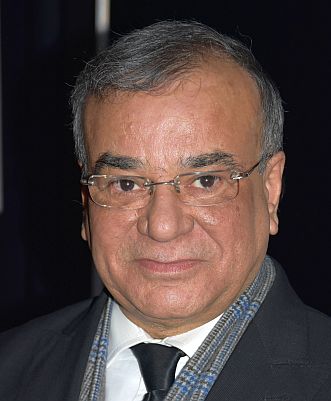
Gautam Banerji has a Master's from St Stephen's College, Delhi, an LL.B. from Delhi University, and an M.Sc.(Econ) degree from the London School of Economics. He taught at an undergraduate college in Delhi, 1973-85, and worked for UNICEF 1985-96. Then he moved to London to practice law. He served as the Judicial Advisor to the Judicial Development Institute, Baghdad, 2009-10 as a U.S. government contractor. He was a member of Commission for Sustainable London (2007-13). He continues as a Trustee and Board Member of Hindu Council, UK. Now fully retired, he lives in Dilijan, Armenia, with his wife, who teaches at United World College, Dilijan.
Early years
The major part of my grandfather's professional career was spent in Burma. Initially, in 1889, he was a clerk in the Accountant General's Office under the British colonial administration. When my grandfather retired, my father had got his law degree from the Law College in Rangoon University after an Honors degree in Mathematics, in which he barely missed getting a Distinction.
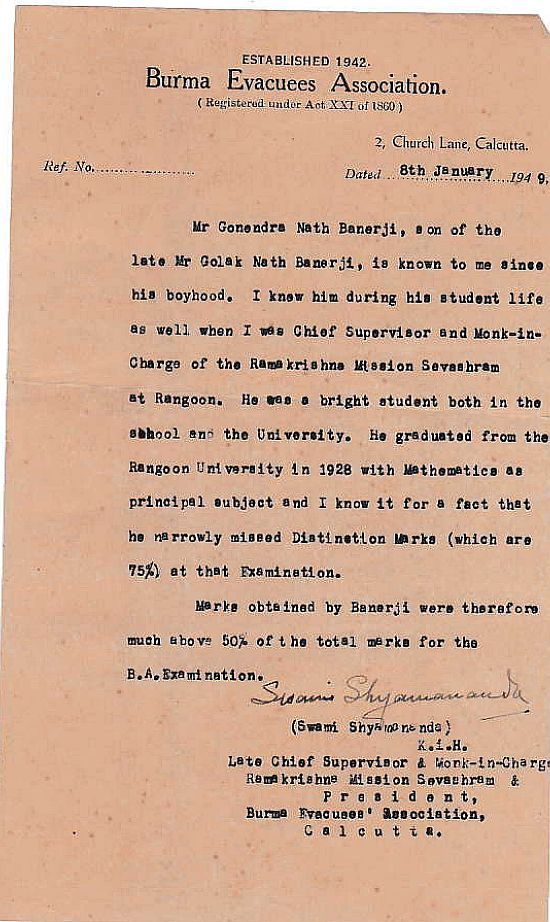
Swamiji was very close to the family, I was told. He wrote this testimonial in 1949 at a time when my father had come to India to get married (1948) and was trying to stay on in India.
Exiled from Burma - looking for work in India
During the Second World War, Japan occupied parts of Burma. The Government of Burma itself shifted to India. And many Indians fled to India. (Editor's note: Read an amazing account of walking from Burma to India. )
Once in India, my father looked for a job. My father knew many people in the government personally and professionally. He did get many testimonials, but I don't know whether he ever got a job in India, having left Burma as an evacuee at the peak of World War II.
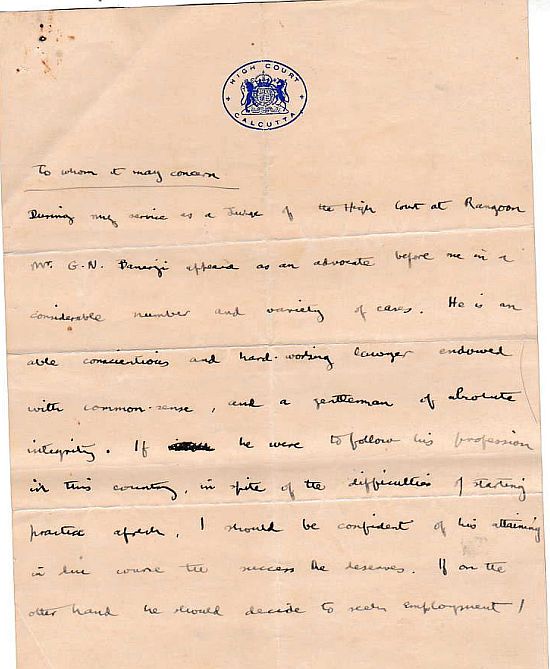
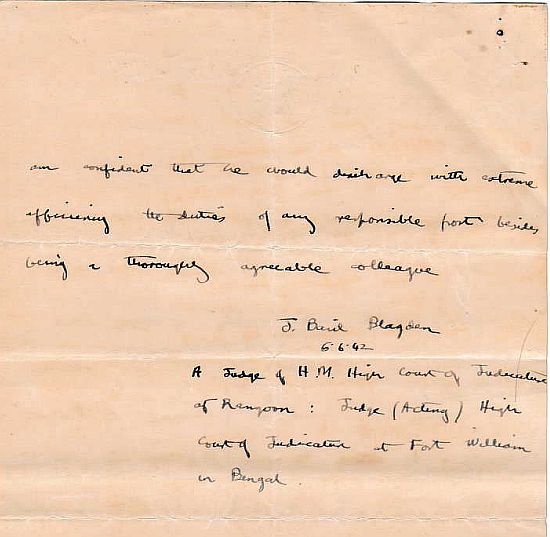
This is a testimonial from Justice Blagden, who had already evacuated to India when the Japanese occupied Burma. The letter is dated June 6, 1942.
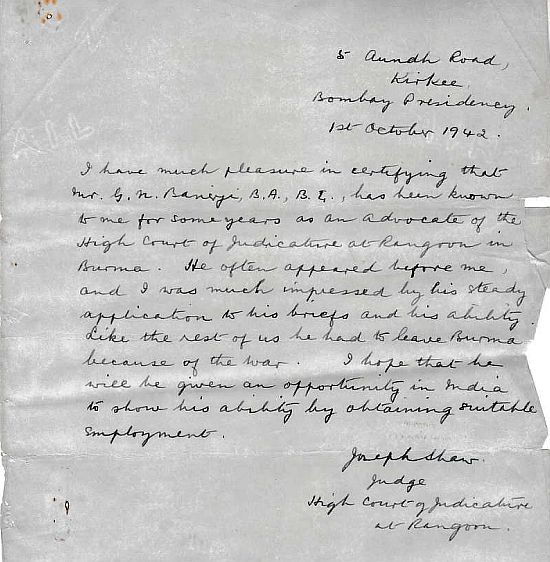
This is a self-explanatory testimonial from Chief Justice Joseph Shaw. It's October 1942 - it seems that my father had not yet found a job.
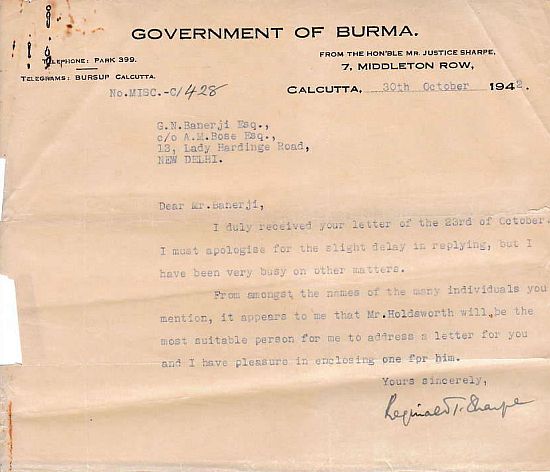
This is an exchange of letters with the Government of Burma operating in exile from Delhi and Simla.
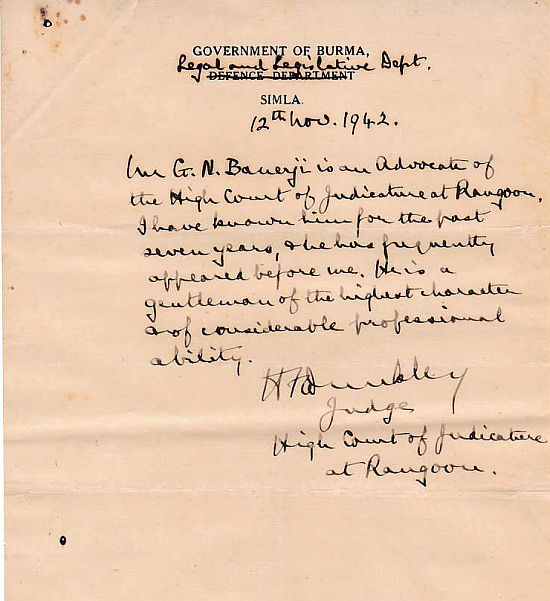
This is a testimonial from Justice Dunkley.
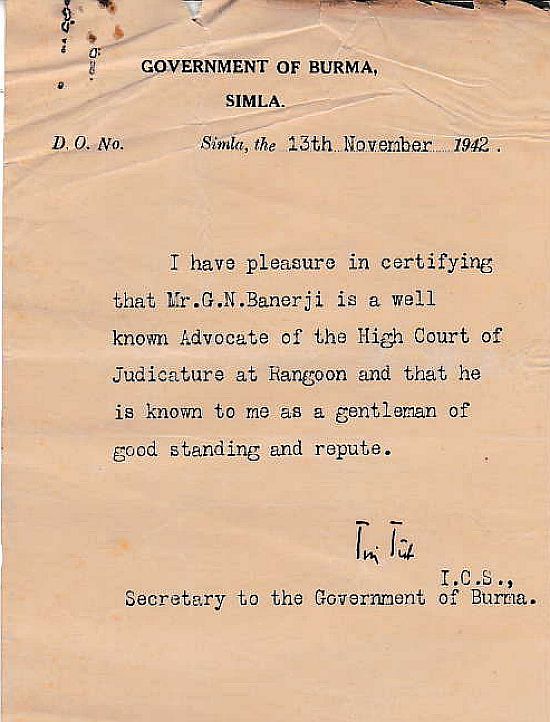
This testimonial is from U Tin Tut, a member of the Indian Civil Service (I.C.S.), who was then Secretary to the Government of Burma in exile in India. He was the brother of Chief Justice Myint Thein, who wrote a testimonial for my father in 1959 (see below). The brothers were part of a preeminent family in Burma in those days. They were very close and kind to my father.
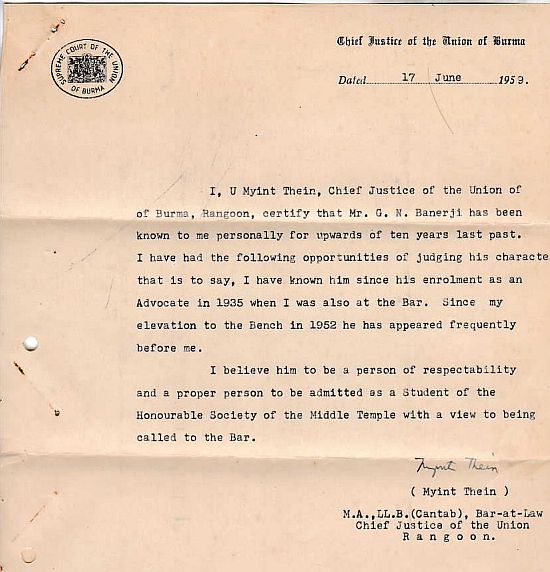
Chief Justice Myint Thein was a brother of U Tin Tut, ICS.

This is a testimonial in 1942 from Chief Justice Goodman Roberts.
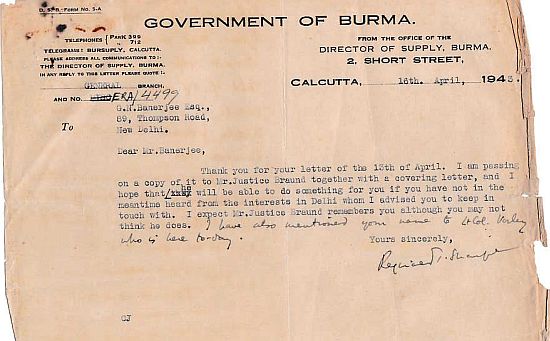
Another bit of communication with the Government of Burma in India upon my father's evacuation to India. It's April 1943. He still seems to be still actively seeking career prospects - the earliest testimonial I have is from Justice Blagden in June 1942. Almost one year earlier.
Return to Burma
He finally decided to join the British Army and return to Burma with the re-occupying forces. Such was his love for Burma! He served in the War with a Commission in the British Army as a Reserve Officer. Many from the Bar and the Bench made it to World War II on non-combative roles, and served well with the Army in Burma Reserve Officers (ABRO). My father was no exception. He joined the War effort as a young Lieutenant, and rose to be a Major by the time peace returned.
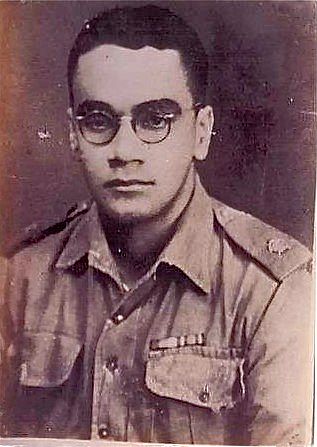
Major G. N. Banerji, my father, during World War II. Burma.
My father served as the District Supply Officer in Mergui District of Lower Burma at the latter half of his staff appointment in the Army, and continued under the civil government briefly when the war ended.
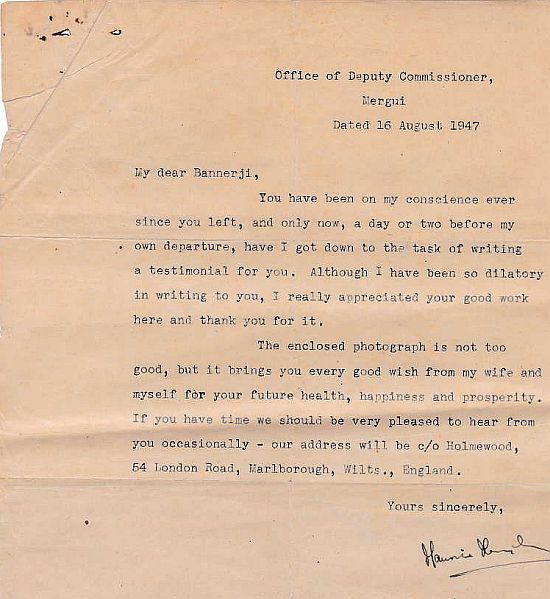
Mr. Maurice Maybury, the Deputy Commissioner of Mergui District at that time, developed a personal friendship with my father. My father was reputed to have saved the district from famine at the peak of the war and was mentioned in dispatches for meritorious service in this regard.
My father was able to revert to his legal practice in Rangoon soon thereafter.
Wedding
My father was several years older than my mother was. He married late because he had been serving in the War effort. My father was already a mature man with many accomplishments when he married my mother, Arati, in 1948,. She was then only a young country girl of eighteen.
My mother's family moved to Mandalai, their country home, from Kidderpore in Calcutta where they lived, during the days of World War II because they were afraid that the Japanese would bomb Calcutta. The port in Kidderpore had already been targeted twice by the Japanese before my mother's family made the move to the safety of their feudal home.
My mother's school education was unfortunately disrupted by the family's move to Mandalai from Kidderpore. The old Ilshoba-Mandalai High School in those days admitted only boys. It was much after my mother's wedding that they added a girls' section to it.
My mother, however, had a voracious appetite for reading from her childhood. It survived through her life. She grew up to be a widely read woman with an enviable collection of good literature in Bengali, which she brought back to India and passed on to me as my share of her legacy. I donated the books to the village library in Mandalai, when my wife and I moved to London. They still survive there today with a pride of place on the shelves.
My mother, though several years younger than my father, provided him the support and comfort he needed through life. My father survived her by ten years but missed every bit of her presence till he passed away at the ripe age of ninety-four.
As for my Dad's wedding it is another long narrative. He arrived in a seaplane at Barrackpore early afternoon on the day of his wedding. My mother's feudal home was packed with relatives speculating on the arrival of the groom for the wedding. He finally made it much to the relief of my grandmother and my mother's aunt, who had been the prime movers for the marriage. Sorry - I have not chanced upon any of the wedding pictures. I guess they were rare those days. However, I do have their pictures taken a couple of year after their wedding.
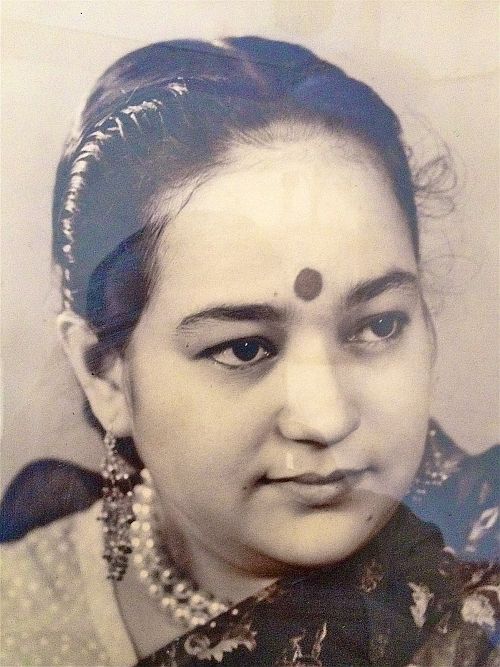
My mother, Arati Banerji. Circa early 1950s.
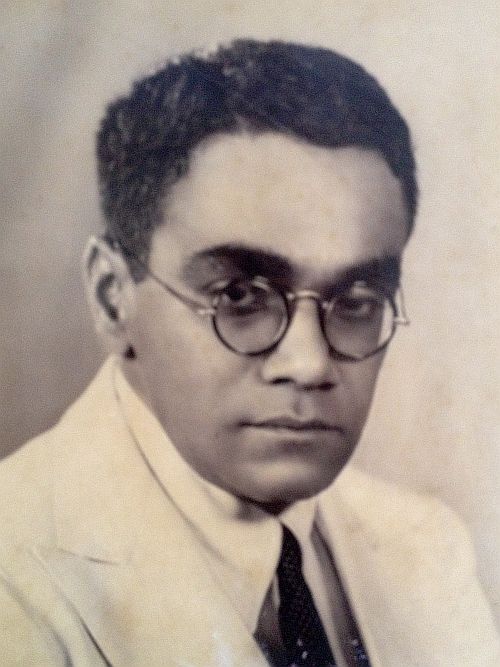
My father, Gonendra Banerji. Circa early 1950s.
Trying to stay in India after getting married
My father made efforts once again to remain in India upon India's Independence in 1947 and his wedding to my mother in 1948. He finally decided to return to Burma instead.
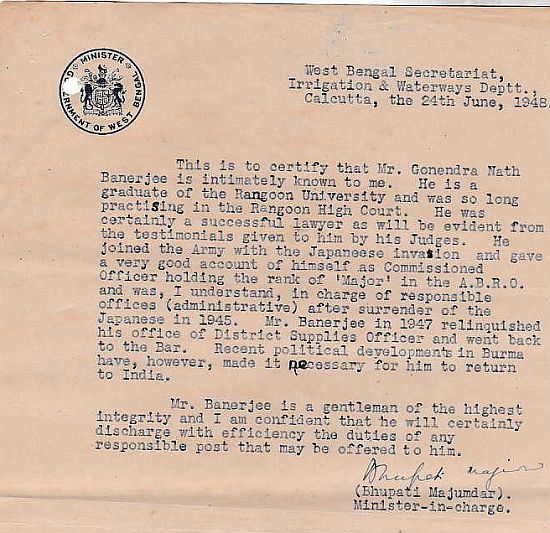
This testimonial is dated June 1948.
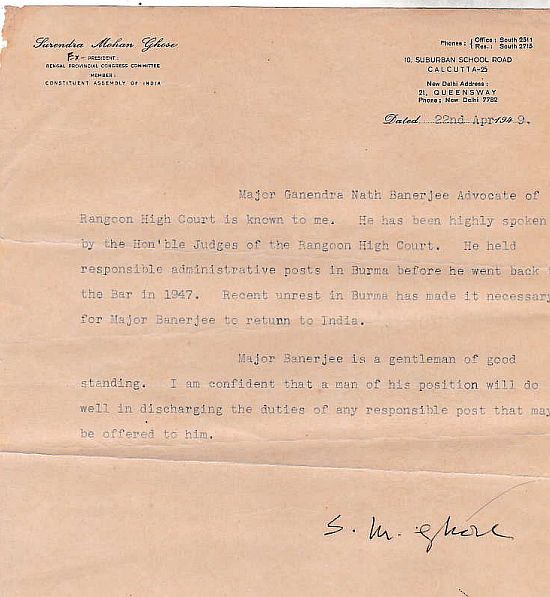
This testimonial is dated April 1949. He had been looking for a job in India from at least June 1948.
Return to Burma and leading the Indian community in Burma
My father finally resolved to return to Burma, where he always belonged. He reached the peak in his legal practice at the Rangoon Bar with a commanding reputation by the time I was growing up in the 1950s. He commanded respect in his community, and led the All Burma Indian Congress as its President from 1964 to 1975, when he finally returned to India. At that time, the All Burma Indian Congress was the central organization representing the Indian community in Burma.
He was the Honorary Legal Adviser to the Indian Embassy in Rangoon through the turbulent days of 1960s. At that time, there were rapid constitutional changes in Burma, which in turn impacted upon the Indian community. Several letters of appreciation from the Indian Ambassadors, who worked closely with my father on repatriation of Indian nationals, bear testimony to the yeoman service he provided to his community for a smooth transition to a new life in India.
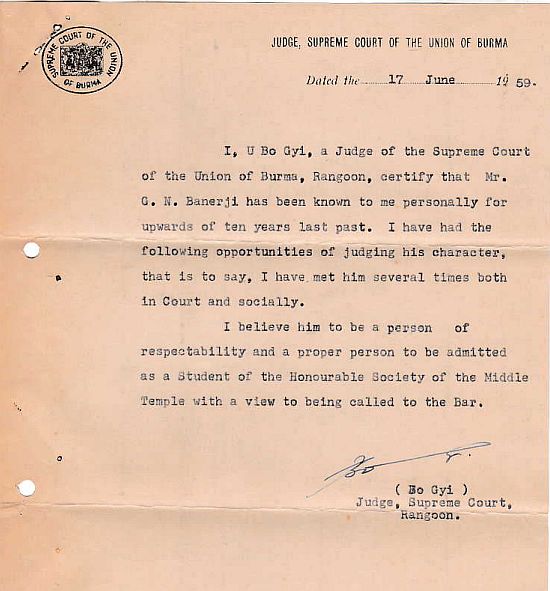
This is a testimonial from Justice Bo Gyi, Supreme Court of the Union of Burma.
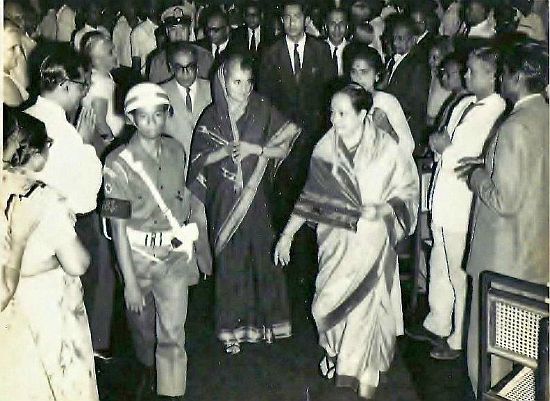
My mother in the foreground, right, with Indian Prime Minister Indira Gandhi close behind on arrival at the civic reception: Strand Hotel, Rangoon, 1967. My father is close behind Mrs. Gandhi and the Indian Ambassador, Admiral Katari is behind him next to the Burmese security officer.
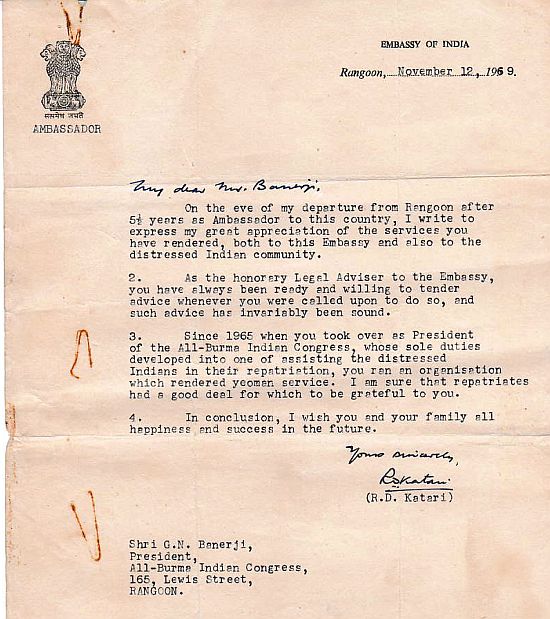
This is a letter of appreciation from His Excellency Admiral Katari. The letter speaks for itself.
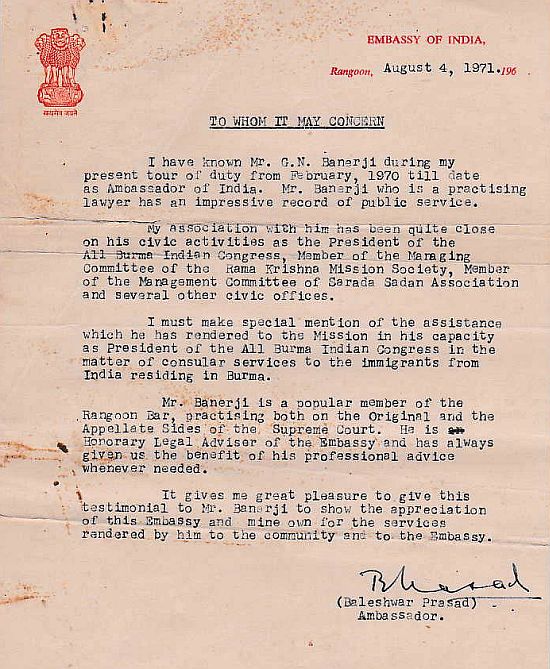
This testimonial from His Excellency Baleswar Prasad again speaks for itself. Soon after his tenure in Burma and return to India, Shri Prasad was appointed the Lieut. Governor of Delhi.
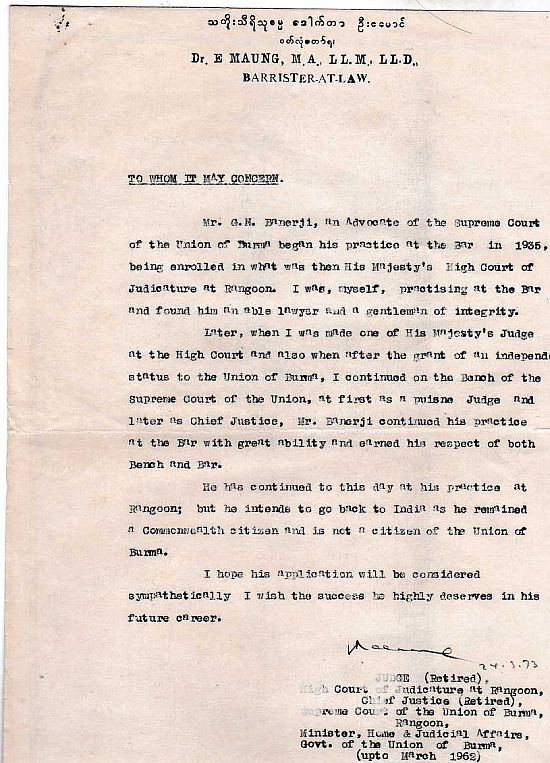
Testimonial in 1973 from Dr. E Maung, retired Judge, Supreme Court of the Union of Burma and the then Minister of Home and Judicial Affairs in U Nu's cabinet. Dr. E Maung also taught at the Law College when my father was a student there.
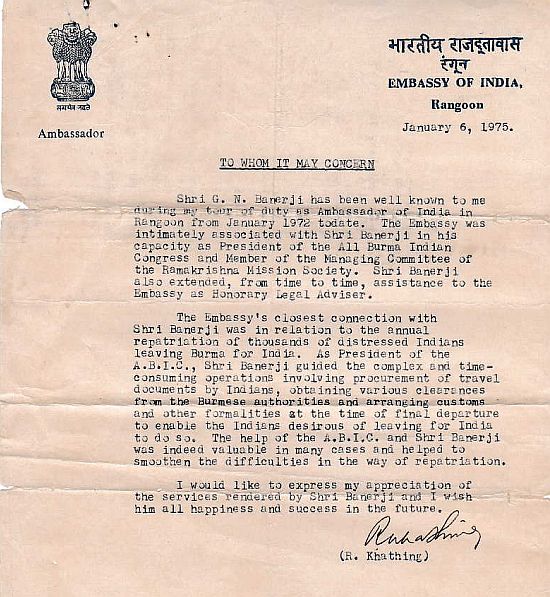
This is a testimonial from His Excellency Shri Kathing, Ambassador of India to Burma. Note in particular the praise of all the three Indian Ambassadors for the role All Burma Indian Congress played in the repatriation of Indians under my father's leadership.
Love for Burma and all religions
My father's love for Burma continued through his life. Here he is sitting in the robes of a Buddhist monk. Upon his funeral, besides Hindu funeral rites, I had three Buddhist monks from the Maha Bodhi Society at our home in Calcutta, chanting prayers for the departed soul. He was equally respected and admired by the Muslim community and often spoke to large audiences on the Prophet's birthday celebrations. He served also as a Trustee on a mosque Waqf in Rangoon.
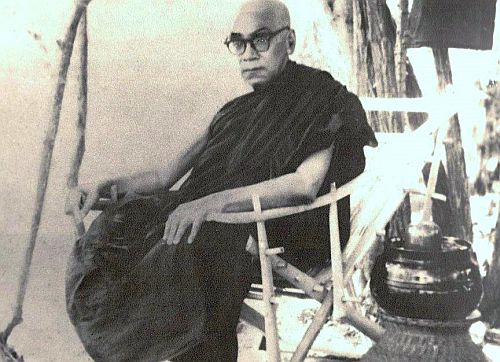
My father in his ochre robes as a Buddhist monk in Burma. Circa 1967.
______________________________________
© Gautam Banerji 2017
Add new comment